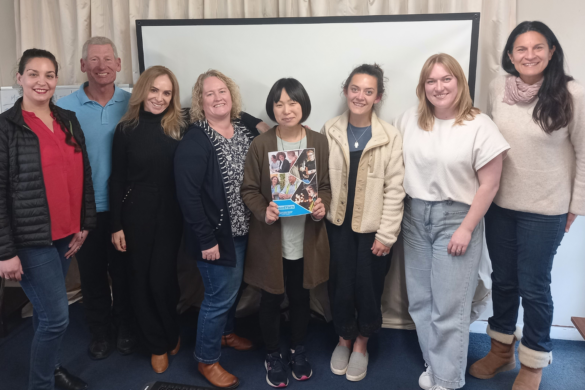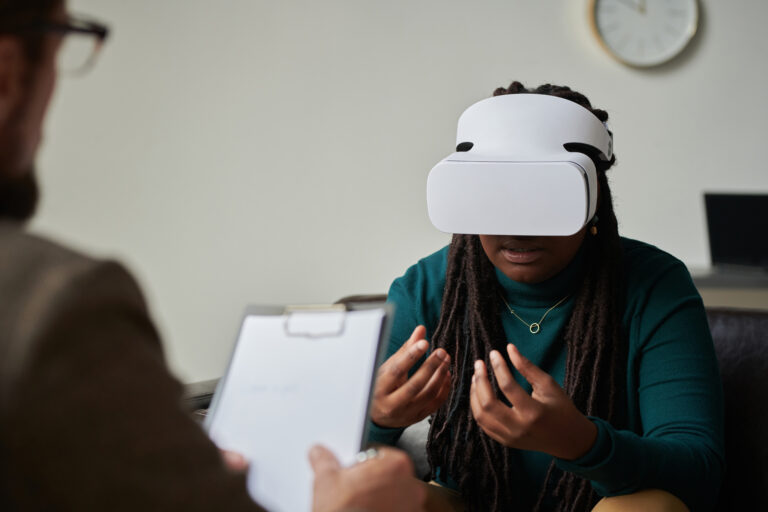Increasing mental health literacy within a community can have a direct impact on the mental wellbeing of a population, promote early intervention and reduce the burden of care on clinical services and community support networks. Yet the fact remains that equitable access to mental health education to improve literacy remains out of reach for many communities.
One organisation in New Zealand – Headlight – is working to change this. Since 2021 their team has been bringing mental health education to diverse and at-risk communities and developing a new model of health education that is making mental health literacy training more accessible and equitable for communities.
Their innovative approach to delivering person-centred, equitable mental health education resulted in high engagement and increased mental health literacy in local priority populations. The team is building on this experience to re-imagine a new approach to making mental health education equitable and accessible for communities across New Zealand and beyond.
The importance of investing in mental health literacy for good mental health
Mental health literacy encompasses essentially four components: understanding how to achieve and maintain good mental health, understanding mental disorders and their treatments, decreasing the stigma related to mental disorders, and increasing the effectiveness of help-seeking (Nobre et al., 2021).
Mental health literacy is well recognised as an effective component for good mental health (WHO, 2013) and yet mental health education is still not widely accessible by large parts of the population.
When people have low mental health literacy they are less likely to reach out for support for mental distress and may not receive appropriate support from medical services and others in the community (Jorm, 2018). The impact is delayed diagnosis, heightened risk of mental health crisis and considerable impact on the wellbeing of the individual and their community support network.
The benefits of increasing mental health literacy at a population level are becoming widely recognised and investment in education through school settings and large workplaces are increasingly being used as health promotion strategies by public health teams to increase literacy. However there are still large gaps in the delivery of this important education into communities, with many of our priority, diverse and high risk communities missing out in terms of equitable access to valuable mental health education..
That’s why Headlight is working to increase mental health literacy in communities by making mental health education more accessible and equitable.

From crisis to innovation
The organisation was founded in response to the COVID crisis and its impact on a small semi-rural community. Headlight was originally formed by a team of local health professionals wanting to actively support the mental wellbeing of its diverse rural population that was harshly impacted by the COVID-related events of 2020. The small population of Queenstown, New Zealand was heavily reliant on tourism pre-COVID and the impact of border closures added extra burden to an already struggling health infrastructure. Large population groups including migrants, new parents and small business owners were identified as being at increased risk of mental distress during this time, with lack of family support, financial pressures and fear of deportation putting increased mental pressure on individuals and families.
The Headlight team co-ran a community hui which identified mental health education as a key strategy for supporting the mental wellbeing of local people. The team secured funding to licence an existing peer-delivered workplace mental health education programme, and adapted it to suit a community-based delivery mode. They trained and supported non-clinical peer facilitators from diverse communities to provide mental health training to their people, at locations and settings that suited the needs of those at risk. They shared stories of lived experience, created safe spaces and worked with cultural leaders to build trust, and increase literacy at a leadership and community level.
Headlight’s actions in enabling a non-clinical, peer-workforce to deliver mental health education to diverse populations in different languages built trust, support and engagement with local people.
Our work to support a peer workforce through ongoing professional development and regular supervision ensured safety and sustainability. Our equity-led approach ensured that the training removed barriers to access and focused on those communities most at risk and hardest to reach.
To date nearly 500 community members have participated in the community based mental health education programme delivered by Headlight. In February 2023 an evaluation (Williams, 2023) found that the pilot programme delivered by the Headlight Team was:
“A successful model for improving mental health knowledge and skills, particularly amongst hard to reach and ethnically diverse communities.”
Most notable was the engagement by audiences with English as a second language during the pilot period (42%), with high engagement particularly in workshops where facilitators were able to directly translate and deliver workshops in their native language.

Replicating this success for other communities
Headlight has been asked by several other communities to bring their programme to other locations in New Zealand, however our team is wanting to replicate our efforts in a way that is sustainable, builds capability locally, utilises existing community networks, is cost-effective and makes it easy for communities to engage with mental health education.
To achieve this, Headlight is now working with a digital technology platform to create a new model for bringing mental health education into diverse community settings. Our intent is to ensure equitable, sustainable, safe and effective creation of mental health education programmes that will support other communities to increase their mental health literacy.
Key principles in our programme development include:
- In-person, group based learning prioritised
Our experience shows us that people learn best when they gather in small, group based, in-person settings, with safe space for discussion and reflection. This approach also builds connection and understanding between participants and reduces stigma through sharing of lived experience.
- Technology supports a consistent, safe delivery and reduces burden on facilitator
By utilising technological platforms we can create training programmes that are safe, tailored, interactive and through which an impactful learning experience can be supported. This removes a lot of the burden of memorised delivery from the facilitator, and the need to be ‘an expert’ in mental health, so that the facilitators role is to safely hold the space for discussion’. By building training that can be integrated within existing community infrastructures, we can support trusted known community leaders and service providers to share this education through their existing community connection points.
- Tailored to maximise effective, equitable engagement
Our programmes are tailored to meet the specific needs of priority communities . This includes the ability to be delivered in different languages, with different videos of peer stories from people with lived experience from their own community This is achieved through working closely with those communities we seek to support.
- Flexible facilitation support as needed
Technology allows us to tailor the level of support required for a community in terms of using an external expert facilitator. This role can be integrated into the delivery of the training either in person, remotely or not at all, as required.
- Reducing cost as a barrier to accessing training
Using technology enables us to disseminate tailored training programmes to audiences at scale and in a way that reduces traditional facilitation cost barriers. Our model supports the delivery of the training programmes by a peer workforce through working with existing community leaders, service providers and other empowered community members. This approach allows us to reduce cost barriers that are commonly passed onto participants for participating in such training events in communities.

Your invitation to join us in transforming the landscape of equitable mental health education
We know that this work is potentially transformative and is filling a clear gap in terms of community infrastructure and could directly impact the mental wellbeing of many communities.
Headlight invites interest from international and national individuals and organisations interested in increasing the mental health literacy of communities. We are already in discussion with academics in New Zealand and Canada to support this important work and welcome interest from other parties who see the potential of this work for our global communities.
To find out more contact Anna Dorsey, Chief Executive and Founder of Headlight at anna.dorsey@headlight.org.nz or visit headlight.org.nz
Anna Dorsey will speak alongside other international mental health literacy leaders at the upcoming eMHIC webinar on Mental Health Literacy on 19th October 2023 at the Education for Wellbeing webinar.
References
Nobre, J., Oliveira, A., Monteiro, F., Sequeira, C., and Ferré-Grau, C. (2021). Promotion of mental health literacy in adolescents: a scoping review. Int. J. Environ. Res. Public Health 18, 9500. doi: 10.3390/ijerph18189500
World Health Organization (2013). Mental Health Action Plan 2013–2020. Geneva: World Health Organization.
A Jorm (2018) – Mental health literacy – Public knowledge and beliefs about mental disorders
Cambridge University Press.
A Williams – GoodYarn Community Pilot Report Feb 2023 . (www.headlight.org.nz)





